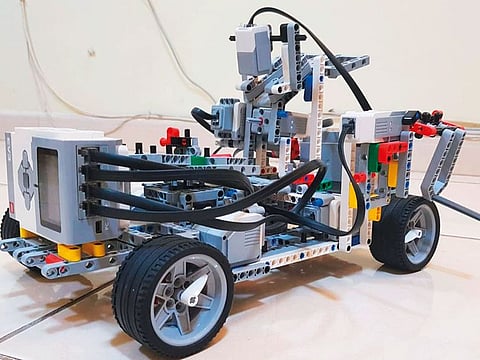Dubai students design smart garbage trucks to tackle landfill crisis
The robot work on solar energy or bio fuel

Three Dubai youngsters want to change the way garbage is collected in cities aiming to become smartcities.
They may only be 14 years old, but Jaden Pereira, Ayman Mohammed and Amit George have developed a prototype of an autonomous robotised garbage truck. It not just collects waste but also segregates it for recycling. The model is only as big as a laptop, but the trio is hopeful that their dream to tackle the huge issue of garbage piling up in ladfills, will come true.
It’s not surprising, as many recent studies have shown that Generation Z not just care about the environment, but also feel the pressure to tackle climate change. Infact, according to the United Nations: “Close to half a million youth around the world have taken action on climate change through SGP [small grants programmes] projects in their homes, schools and communities.”
Not just a school project
What started in January as an idea for a national robotic olympiad has become more than just a school project.
Pereira said: “The topic given to us was Smartcity. While others focused on building smartcities, we looked at how to improve them.
“We decided to tackle a problem most cities are finding hard to deal with - waste management.”
Global statisitics show that every year we dump nearly 2.12 billion tons of waste. A large part of this ends up in landfills. While landfills are filling up quickly, the amount of trash humans produce is certainly not decreasing.
How it works
To tackle the issue, the students built a robot that they named the MSV, an acronym for Mechanised Sanitation Vehicle.
Running on solar energy or bio fuel, this driverless truck with built in GPS is designed to go around the city on its own to collect trash from bins placed at designated spots.
It picks up the trash can and empties it into the truck and periodically sorts it out into separate bins. The waste can then be transported to recycling stations, reducing the waste that reaches landfills.
Autonomous solution
Pereira said they took into consideration some important points: “The old trucks need manual labour, atleast 3 people in a vehicle. This vehicle functions on a program, has cameras and sensors that make sure it is safe on roads and in case there is a problem, there are cameras that can transmit live feed so that a human in-charge can resolve the issue remotely.”
It wasn’t an easy task
“It was Ayman who came up with the idea. Amit handled the programming bit, and I built it,” said Jaden.
Initially, the trio faced many challenges. He added: “The robot wasn’t coming together, at time the parts came off because of the initial design, sometimes the brain would not function.”
Finally, the team realised that it was because they did not have enough knowledge of how vehicles are built.
So, they went to a vehicle architect to understand the basics.
Finally, two months and three lego kits later, there was success. With the help of their robotics coach at school, Udaya Balakrishna, and their parents, the protoype took shape.
However, the competition did not happen.
But, that did not stop the three pupils studying at Our Own High School in Dubai’s Al Warqa’a. For Jaden, Aymaan and Amit this had become more important. The model prototype was showcased at the Dubai Land department and the youngsters were awarded for their work with a certificate excellence. “The officials were impressed with our idea,” said Periera.
Dubai’s waste management plan
According to their official website Dubai Municipality’s Waste Management Department prepared the Dubai Integrated Waste Management Master Plan in 2012 with an aim to reduce the amount of waste being sent to the landfills to zero in 20 years by using an integrated and innovative approach.
Dubai Municipality has announced that it will establish the largest plant in the Middle East to convert solid waste into energy at a cost of Dh2 billion in the Warsan district. The move also comes in line with the National Agenda to reduce the landfill by 75 per cent by 2021, in addition to protecting the environment from methane gas emitted by the landfill. The implementation period will take three years and the plant will be operational in the second quarter of 2020 during which it will receive 2,000 metric tonnes of municipal solid waste per day in the first phase to produce 60 megawatts. The waste incineration project is the first of the four projects to produce green energy.

